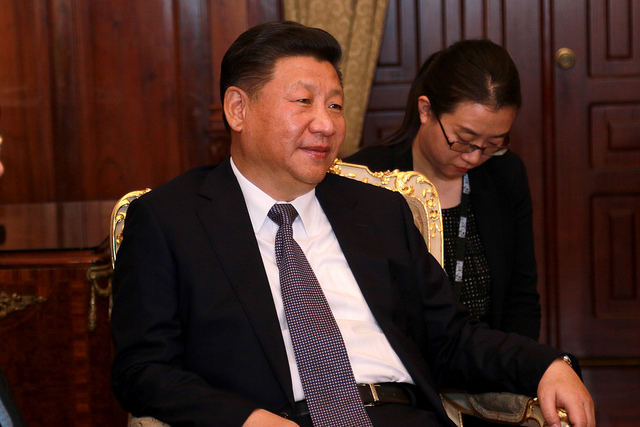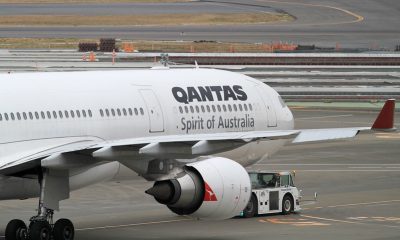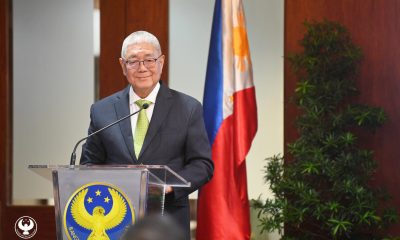World News
Make China Great Again! Xi leads China into muscular new era

FILE: The overall goal seems clear: Restore China to its traditional role as East Asia’s leading nation and a global economic and cultural force.(Photo: Agencia de Noticias ANDES/ Flickr)
BEIJING— In this summer’s “Wolf Warrior II,” Chinese action star Wu Jing portrays a tough super-patriot who rescues both fellow countrymen and oppressed Africans with help from the People’s Liberation Army.
Audiences loved what became China’s biggest-grossing movie ever. Some reportedly sang the national anthem as the movie closed on an image of a Chinese passport and the words, “Please remember, at your back stands a strong motherland.”
This red-blooded nationalism has been channeled skillfully by President and ruling Communist Party leader Xi Jinping as he seeks to strengthen the party’s role in Chinese life and shepherd the country’s rise to prominence at a time when the United States and others in the West are seen to be in retreat.
Xi’s muscular foreign policy could become even more assertive following this month’s congress of the ruling Communist Party, where delegates will agree to support his policies and endorse his second five-year term as party secretary general, observers say.
“Xi’s on a roll,” said June Teufel Dreyer, professor of political science at the University of Miami. She predicted he would continue expanding China’s influence by gradually increasing pressure on other countries, a tactic seen in Beijing’s steady island-building efforts in the South China Sea, for instance.
In an address Wednesday to the congress’ opening session, Xi reiterated that China pursues an “independent foreign policy of peace” and maintains a defensive military posture. However, he also warned other countries not to underestimate China’s willingness to stand up for itself.
“No one should expect China to swallow anything that undermines its interests,” Xi told delegates at Beijing’s hulking Great Hall of the People.
For years, after its emergence from hard-line Marxism in the late 1980s, China stuck to reformist leader Deng Xiaoping’s dictum to “keep a low profile and bide one’s time, while also getting things done.”
That began to change after the last decade’s global financial crisis, from which China emerged relatively unscathed, and the country’s foreign policy has since shifted into high gear under Xi.
China has succeeded in leveraging its booming economy and mountain of foreign currency holdings to influence other nations and further its global ambitions. A key watershed came this year, when the People’s Liberation Army began manning China’s first overseas base in Djibouti, reversing decades of rhetoric eschewing such facilities as imperialist Cold War holdovers.
The overall goal seems clear: Restore China to its traditional role as East Asia’s leading nation and a global economic and cultural force.
Xi said as much in his opening address on Wednesday when he outlined a vision of raising China’s international stature. By 2050, Xi said, China would be “a global leader in terms of composite national strength and international influence.”
“Xi presents very bold visions for where China should be headed and what China must become,” said Jingdong Yuan, an Asia-Pacific security expert at Australia’s University of Sydney.
A more forceful post-congress approach could include expanding China’s role in international bodies and new China-sponsored initiatives such as the Asian Infrastructure Development Bank. China could also become more assertive in regional hot spots such as the South and East China Seas and its contested border with India.
Perhaps no strategy reflects Xi’s vision more clearly than the “Belt and Road Initiative” launched around the time of Xi’s elevation five years ago. The massive undertaking seeks to link China to Southeast Asia, Central Asia, Africa, Europe and beyond with a sprawling network of roads, railways, ports and other economic projects valued in the hundreds of billions of dollars. The goal is to make China an indispensable economic partner with expanded political influence, while offering new opportunities for Chinese businesses weighed down by overcapacity and shrinking markets at home.
To do this, China has refined its diplomacy to take advantage of favourable global trends while not going so far that it would damage relationships with its neighbours and the United States, Yuan said.
In some areas, China has proved unyielding. Beijing, for instance, angrily rejected last year’s ruling by an international tribunal in The Hague in a Philippine case that invalidated most of China’s territorial claims in the contested South China Sea.
It has also taken a hard line against South Korea’s deployment of a U.S. anti-missile system that Beijing calls a security threat. South Korea has been vilified in Chinese state media, with Chinese group tours banned and South Korean businesses in China hit hard.
However, the pragmatic approach more often wins out.
Beijing has largely resisted the urge to fire back when U.S. President Donald Trump lambasts China for not doing enough on North Korea or allegedly cheating at trade, instead offering measured responses. Xi, meanwhile, pulled off a successful visit to Trump’s Mar-a-Lago Florida estate that was heavy on the sort of positive optics Beijing prefers. Trump is now due to travel to Beijing in November.
In China’s latest border standoff with India, Beijing agreed to a mutual pullback of forces just days ahead of a China-hosted summit of large developing economies attended by both Xi and his Indian counterpart, Narendra Modi.
Beijing has also softened its approach to charm Philippine President Rodrigo Duterte, offering him infrastructure investment and military assistance against Muslim rebels, while agreeing to allow Philippinefishermen to return to their traditional grounds in Scarborough Shoal, which China seized in 2012.
The approach seems to be working. The results of a recent Pew Research Center survey show two-thirds of Filipinos believe strong economic relations with China are of greater importance, as opposed to 28 per cent who say getting tough with China over territorial disputes is more important. When last asked the question in 2015, Filipinos were divided almost evenly on what was more important.
Domestic politics also play a role in the shape of Chinese foreign policy. Leaders have traditionally used nationalism to blunt opposition and discontent, said Yinan He, an expert on Chinese foreign policy at Lehigh University in Bethlehem, Pennsylvania.
If Xi fails to win total backing for his appointments and policies at the congress, “he may continue to unleash foreign assertiveness, and may even seek out conflicts with certain countries that can arouse patriotic support at home,” He said.





















